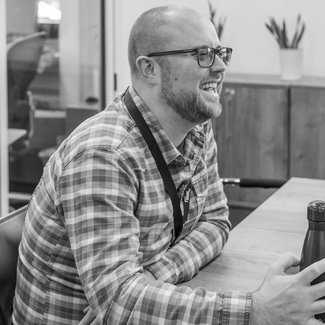Island communities offer a unique setting for young people to grow up and prepare for life and work, as we know through our Island Education Network, But they are also a fertile testing ground for new ideas adaptable to mainland education systems. Worldwide, island schools are leading the charge in areas from digital transformation to inclusive curricula. To explore how island innovators can inspire educators of any persuasion, on Thursday, September 12, Edge sponsored a session at the Virtual Island Summit 2024.
Rachel Lewin (Deputy Head Teacher, Five Islands Academy, Isles of Scilly) shared her school’s journey from Ofsted special measures in 2016 to a high achieving, creative, ambitious academy that supports 250 students from 4 to 16 across five disparate Isles of Scilly communities. Since 2016, Five Islands has embraced a broad, integrated curriculum, tracing essential disciplinary concepts from reception through Year 11. As a small school, every educator has since become a curriculum designer and leader in their subject area.
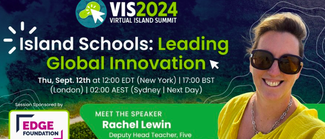
The school has also established strong community connections including with tourism organisations, employers, and conservation trusts. Three times a year, a School Project Week sees all students collaborating on a shared topic, such as island sustainability, with partners participating.Project weeks provide rich learning experiences for students and help rebuild trust across the community. The proof is in the pudding – Five Islands Academy’s most recent Ofsted inspection praised their new curriculum for expanding learners’ horizons and logically building knowledge and skills across the school journey. Their GCSE results and Progress 8 figures now significantly exceed the national average.
Richard Tarves (Business Development Officer, e-Sgoil, Stornoway) demonstrated island innovation’s impact on mainland education. Established in 2016 to address acute teacher shortages in the Outer Hebrides, e-Sgoil offers interactive online teaching from qualified teachers directly into classrooms. The service addresses disparities in subject choices and progression pathways. It also provides greater accessibility for SEND learners, particularly those with poor mental health who cannot attend school.
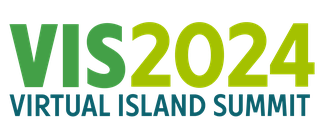
However, E-Sgoil flourished during the pandemic when it provided an educational safety net to Scottish schools on the mainland. With Scottish government funding, they are now an established national education service, offering various e-learning programmes. These are aiding post-pandemic recovery and modernisation of the education system. With specialists across over 60 national qualifications and careers support from 88 employers, this demonstrates how island innovation can adapt to meet learner needs anywhere.
Will Quirke (Teaching Fellow, Sustainable Development Education, The Strathclyde Institute of Education) and Christina Rundel (Study Coordinator on Sustainability Studies, University Albstadt-Sigmaringen) shared a three-year-long Island Schools Erasmus+ project. With partner islands in Greece, Iceland, Scotland, Spain, and the Netherlands – and rural schools in Valencia – the project targeted shared sustainability challenges and collaboration between European islands. Their goal was to create a sustainable future for education in island communities while addressing demographic development in settings where there is often a brain drain of young people to the mainland.
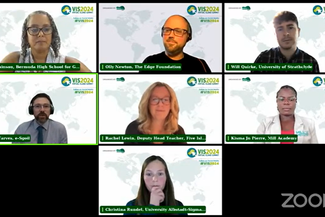
The project produced two key outcomes: first, a suite of collaboratively produced learning materials for sustainable tourism, sustainable transport, and ocean plastics; second, policy recommendations shaped through regional stakeholder meetings. These sought input from teachers, policymakers, students, NGOs, employers, and academics. Recommendations include more consideration of place-based needs and opportunities for exchange and collaboration between island communities.
Further afield, Kisma Panthier-Jn Pierre (Founder & Principal, Mill Academy Ltd., Antigua & Barbuda) shared her passion for helping others reach their full potential through education. After starting out teaching learners in her basement, Kisma helped found Mill Academy Ltd during the pandemic. Mill Academy’s curriculum emphasises entrepreneurial thinking, leadership skills, and emotional intelligence, cultivating critical thinkers and future leaders who can operate locally or globally. Crucially, the school’s ethos encourages students to value and pursue their ideas without being constrained by their location. A typical week exposes learners to languages like Mandarin and Spanish alongside core subjects (including maths and science) balanced with sports, music and art. Students also engage with coding and robotics, take yoga classes, and tend to a vegetable garden on Friday afternoons to promote well-being and environmental stewardship. While only in its second year of operation, Mill Academy’s diverse offering has already engaged students. The school has recently received funding approval to build a smart classroom, allowing students to connect with mentors and experts worldwide – further bridging the gap between local and global perspectives.
Carol Swainson (Principal of Bermuda High School for Girls) leads a long-established institution founded in 1894. While the school boasts a tradition of academic success, one of its more recent achievements is opening an Innovation Centre. The centre features a maker space where students focus on creative STEAM projects, from robotics to sewing. It also includes a boardroom where girls can practice discussions and symposiums – building confidence to enter a space they may encounter later in their careers. The school is also innovating in the area of mental health. Over the past two years, efforts have focused on reducing social anxiety by limiting social media and screen time on campus while encouraging parents to engage more personally and foster more play-based childhood experiences for their children.
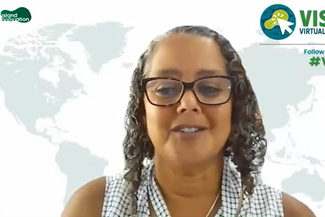
Carol neatly summed up what became evident throughout all the presentations – island communities are not limited by their status. Rather, being an island offers opportunities that mainland schools often lack. Students become representatives of their unique location, which can teach them just how much they have to offer. Mainland education can learn a lot from islands about adaptability and creativity.

